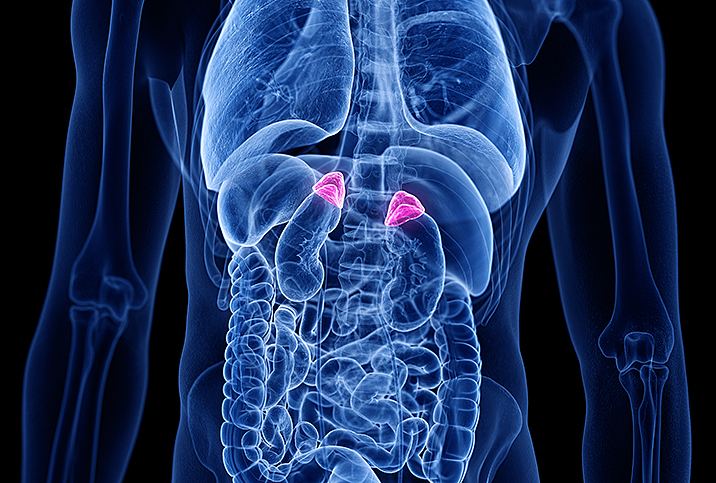It's Not Stress, It's Cushing Syndrome

As people age, they may gain weight and feel sluggish. The sensation of weakness and sadness can develop, too. Often these feelings are attributed to stress, but it could be Cushing syndrome, named for Harvey Cushing, a distinguished American neurosurgeon who first described patients with these symptoms in 1912.
Defining Cushing syndrome
"Cushing syndrome is an endocrine condition that results from the presence of too much cortisol in the body," said Lisal Folsom, M.D., pediatric and adult endocrinologist based in Louisville, Kentucky. "This can happen either because of excessive cortisol production, or if a person uses higher doses of glucocorticoid medications for a prolonged period of time.
"Cortisol is a hormone produced by the adrenal glands," she added. "It helps our bodies respond appropriately to stress, maintains blood pressure, assists with metabolism, and contributes to immune system function."
The hallmark signs of Cushing syndrome are a fatty hump between your shoulders, a rounded face, and pink or purple stretch marks on your skin. The main functions of cortisol is helping regulate blood pressure, reducing inflammation and keeping the heart and blood vessels functioning normally. Cortisol also regulates the way your body converts proteins, carbohydrates and fats in your diet into energy.
What does Cushing syndrome look like?
Signs and symptoms of Cushing syndrome can include insulin resistance, prediabetes, type 2 diabetes, elevated blood pressure and muscle weakness. Increased fat tissue accumulation in the face, neck, shoulders and abdomen is common, plus thin skin that bruises easily. Other symptoms are decreased bone mineral density and osteoporosis, as well as thick, dark purple stretch marks and depression.
Some gender-specific symptoms may also occur. For example, women may experience thicker or more visible body and facial hair (hirsutism) and irregular or absent menstrual periods. Men are more likely to have a decreased sex drive, fertility complications and erectile dysfunction. Cushing syndrome can also manifest as severe fatigue, loss of emotional control, and cognitive difficulties, and it can impair growth in children.
"Cushing syndrome describes any situation where there is excess cortisol, including cortisol from direct adrenal gland overactivity or from adrenal gland stimulation by the pituitary gland, as well as increased cortisol in the body due to medications," Folsom said. "Cushing disease refers specifically to a pituitary tumor causing excessive adrenal gland stimulation through excess production of a hormone called ACTH [adrenocorticotropic hormone]."
The intersection of Cushing syndrome and diabetes
"Chronic high levels of cortisol in the blood can lead to peripheral insulin resistance and stimulation of the liver to create new glucose," said Odelia Lewis, M.D., a family physician based in Brooklyn, New York. "Hypercortisolism also causes a redistribution of body fat from peripheral sites to more central sites, such as the trunk and visceral organs."
Risk factors include taking large amounts of synthetic glucocorticoids, such as prednisone, and being female: Women are three times more likely to be affected by Cushing syndrome than men.
"Any condition that causes similar symptoms can mimic Cushing syndrome," Folsom added. "Obesity, menopause, type 2 diabetes, heart failure and severe hypothyroidism are a few."
People who have tumors of the adrenal or pituitary glands could also be at a slightly higher risk for Cushing syndrome, as well as an abnormal production of other hormones. If a tumor of an adrenal or pituitary gland is identified incidentally on imaging performed for another reason, consulting an endocrinologist to help evaluate for hormonal activity of the tumor is a reasonable next step.
How is Cushing syndrome diagnosed?
There are a number of screening tests that can be used to evaluate for possible Cushing syndrome.
The first and most common is a blood test called a dexamethasone suppression test. This is performed by taking a one-time dose of dexamethasone at 11:00 the night before, and then having a blood cortisol level drawn at 8:00 the following morning. Dexamethasone is a potent glucocorticoid (steroid hormone) that suppresses the body's adrenal gland function. If the adrenal glands are responding appropriately, the morning cortisol level should be lower. If it's higher than expected, Cushing syndrome could be the cause.
Another screening test is a 24-hour urine collection for free cortisol. If there is a higher-than-normal amount of cortisol in the body, levels will be higher in the urine.
The third screening test is midnight salivary cortisol testing. The body typically makes very little cortisol at night and during sleep, so if the midnight salivary cortisol is high, Cushing syndrome is more likely.
Managing the disease and treatment options
The treatment depends on the underlying cause. If Cushing syndrome is triggered by high doses of steroid medication, working with an experienced physician to slowly decrease and stop the medication if possible is the best approach.
If Cushing syndrome is precipitated by a tumor of the adrenal gland, pituitary gland or other tissues in the body, the first-line treatment would be surgery to remove the tumor. If surgery proves to be unsuccessful in this instance, there are several different medications that can be used to either decrease cortisol production or limit the effects of cortisol on the body.
The key is always to get an early diagnosis and access treatment as soon as possible. If you think you may have Cushing syndrome, reach out to your doctor to discuss possible tests and options going forward immediately.


















